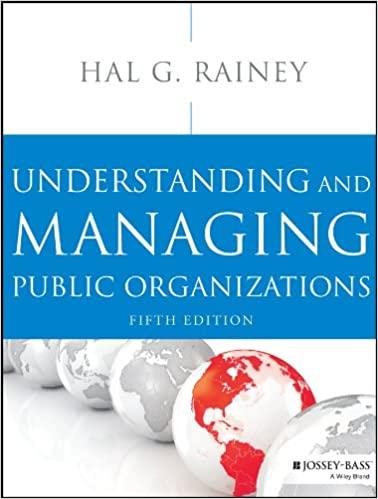Question
Demonstrate your mastery of the following competencies: Use financial management and teamwork principles to guide and improve strategic planning and reimbursement Recommend models and methods
Demonstrate your mastery of the following competencies:
- Use financial management and teamwork principles to guide and improve strategic planning and reimbursement
- Recommend models and methods to inform and improve revenue-cycle processes
- Analyze federal, state, and third-party payer regulations and reporting guidelines for reimbursement compliance.
Scenario:
You are a healthcare consultant hired by a large healthcare organization. The organization has some new members on the board of directors who have requested an orientation on the organizations strategic planning, revenue-cycle processes, and reimbursement-compliance processes. As a consultant, you have been asked to educate the new board members at their next retreat on these areas, highlighting internal strengths and weaknesses, as well as external opportunities and barriers that might impact financial performance and reimbursement.
Create a PowerPoint presentation with a separate speaker notes document for educating the board of directors on strategic planning, revenue-cycle processes, and reimbursement compliance processes. In your speaker notes, be sure to indicate which notes belong with each slide.
Address the following PLEASE -
- Introduction: Introduce your presentation, including a concise, high-level overview of what topics and information will be covered in the presentation.
- Strategic Planning: Determine how overall strategic planning can potentially be improved by applying financial management and teamwork principles within your organization.
- Financial Management Principles: Summarize how other healthcare organizations have successfully used financial management principles to inform and improve their overall strategic planning.
- Collaborative Teamwork Integration: Describe from the lens of a healthcare administrator how collaborative teamwork principles can be integrated into your healthcare organization, particularly principles related to revenue cycle processes.
- Staffing Impact: Evaluate how staffing across the department impacts revenue cycle outcomes and team performance.
- Healthcare Reimbursement: Analyze the importance of improving healthcare reimbursement processes for the organization and various stakeholders.
- Improvement Processes: Determine which principles and processes your healthcare organization can either implement or update within their policies, explaining how these implementations or updates will improve overall reimbursements for various stakeholders.
- Payer Model Advantages and Disadvantages: Analyze the advantages and disadvantages of both governmental and nongovernmental payer models, as well as their impact on various stakeholders.
- Managed Care Plan Advantages and Disadvantages: Analyze from the lens of a healthcare administrator the advantages and disadvantages of a managed care plan and their impact on various stakeholders.
- Revenue-Cycle Process: Analyze the importance of improving revenue-cycle processes for the organization and various stakeholders.
- Models and Methods: Evaluate which model(s) and method(s) you believe will positively impact revenue-cycle processes within your healthcare organization.
- Workflow Assessment Findings: Explain the effectiveness of current internal workflows for your healthcare organization based on your completed assessment, as well as how these workflows can be adjusted to further enhance the organizations cash flow and overall financial strength.
- Reimbursement Compliance: Analyze the overall impact of current federal, state, and third-party payer regulations and reporting guidelines on reimbursement compliance for the organization.
- Regulations: Analyze at least one federal, one state, and one third-party payer regulation that could affect your healthcare organization, providing examples of both positive and negative impacts on various stakeholders for each regulation you identify.
- Reporting Requirements: Analyze at least one federal, one state, and one third-party payer reporting requirement that could affect your healthcare organization, providing examples of both positive and negative impacts on various stakeholders for each reporting requirement you identify.
- Technology and System Impacts: Evaluate how required technology and system impacts for reporting guidelines and regulatory compliance affect your healthcare organization, both positively and negatively.
- Recommendations: Recommend changes your healthcare organization can make to maximize reimbursement opportunities for patients, staff, and various stakeholders.
Your presentation should be evidence based. Five citations should be from your independent search for evidence. Please do not submit information without these citations!
(not from the scenario, textbook, or module resources) of credible sources and be current within the last five years.
Step by Step Solution
There are 3 Steps involved in it
Step: 1

Get Instant Access to Expert-Tailored Solutions
See step-by-step solutions with expert insights and AI powered tools for academic success
Step: 2

Step: 3

Ace Your Homework with AI
Get the answers you need in no time with our AI-driven, step-by-step assistance
Get Started


